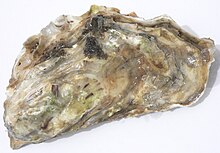Oysters
Appearance

Oysters are any of a number of distinct groups of bivalve molluscs which live in marine or brackish habitats. The valves are highly calcified. Some kinds of oyster are commonly consumed by humans, cooked or raw. These are considered an aphrodisiac. Others, such as pearl oysters, are not.
Quotes
[edit]- ... I shall never forget the indulgence with which he treated Hodge, his cat: for whom he himself used to go out and buy oysters, lest the servants having that trouble should take a dislike to the poor creature.
- James Boswell, The Life of Samuel Johnson. Oxford University Press. 1998. p. 1216. (1st edition 1791)
- When God made the oyster, he guaranteed his absolute economic and social security. He built the oyster a house, his shell, to shelter and protect him from his enemies... But when God made the Eagle, He declared, "The blue sky is the limit—build your own house!"… The Eagle, not the oyster, is the emblem of America.
- Author unknown; reported in Jacob M. Braude, Braude's Source Book for Speakers and Writers (1968), p. 14; Respectfully Quoted: A Dictionary of Quotations (1989).
- It is unseasonable and unwholesome in all months that have not an R in their names to eat an oyster.
- Samuel Butler, Dyet's Dry Dinner (1599).
- 'Twere better to be born a stone
Of ruder shape, and feeling none,
Than with a tenderness like mine
And sensibilities so fine!
Ah, hapless wretch! condemn'd to dwell
Forever in my native shell,
Ordained to move when others please,
Not for my own content or ease;
But toss'd and buffeted about,
Now in the water and now out.- William Cowper, The Poet, the Oyster and Sensitive Plant; reported in Hoyt's New Cyclopedia Of Practical Quotations (1922), p. 575.
- The geology of Patagonia is interesting. Differently from Europe, where the tertiary formations appear to have accumulated in bays, here along hundreds of miles of coast we have one great deposit, including many tertiary shells, all apparently extinct. The most common shell is a massive gigantic oyster, sometimes even a foot in diameter.
- Charles Darwin, The Voyage of the Beagle. 1909. pp. 184–185. (1st edition 1839}
- Secret, and self-contained, and solitary as an oyster.
- Charles Dickens, A Christmas Carol (1843), Stave I.
- "It's a wery remarkable circumstance, sir," said Sam, "that poverty and oysters always seem to go together."
- Charles Dickens, Pickwick Papers (1836), Chapter XXII.
- ... Oysters taste like the sea. This fundamental truth has been pointed out enough times that it easy to forget how extraordinary it is. Oysters taste like the sea. No other food does. Not lobster, not saltwater fish, not scallops or clams or even kelp. Beef tastes meaty, milk tastes creamy, but the comparison for oysters is not a taste or another food but always a place. And a place—the seacoast—for which many of us have romantic associations. From oysters I learned that what's important about good food is not just what it gives you, but where it can take you.
- Rowan Jacobsen, A Geography of Oysters: The Connoisseur's Guide to Oyster Eating in North America. Bloomsbury Publishing USA. 9 August 2010. pp. 1–2. ISBN 978-1-59691-814-6.
- As a consequence of their ability to accumulate potential pollutants, pearl oysters have been used as localized biomonitors of both heavy metals (Bou-Olayan et al., 1995; Al-Madfa et al., 1998) and hydrocarbons (Fowler et al., 1993). Furthermore, pearl oysters have also been shown to accumulate antibiotics such as sulfamethazine and thus may serve as a useful biomonitor of antibiotic presence (McFarlane, et al., 2004). The wide global distribution of pearl oyster species also lends them to being a suitable candidate for regional or global environmental monitoring of marine pollution. (Sarver et al., 2003; Gifford, 2006).
- Wayne O'Connor and Scott P. Gifford, "Chapter 14. Environmental Impact of Pearl Farming". The Pearl Oyster. Elsevier. 19 August 2011. pp. 497–526. ISBN 978-0-08-093177-7. (edited by Paul Southgate and John Lucas; quote from p. 512)
- I will not be sworn but love may transform me to an oyster; but I'll take my oath on it, till he have made an oyster of me, he shall never make me such a fool.
- William Shakespeare, Much Ado About Nothing (1598-99), Act II, scene 3, line 20.
- An oyster may be crossed in love! Who says
A whale's a bird?—Ha! did you call my love?—
He's here! he's there! he's everywhere!
Ah me! he's nowhere!- Richard Brinsley Sheridan, The Critic, A Tragedy Rehearsed (1779), Act III, scene 1.
- He was a bold man that first eat an oyster.
- Jonathan Swift, Polite Conversation (c. 1738), Dialogue II.


